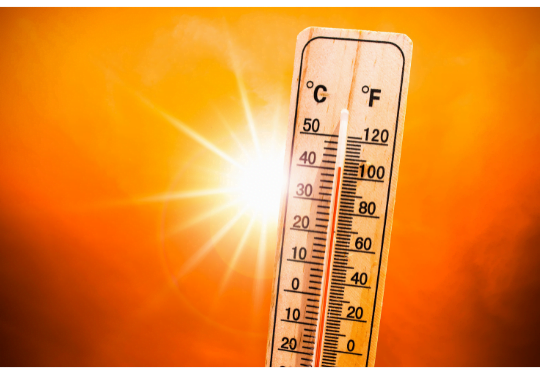Heat-related illnesses are no joke.
In Calgary, Alberta, when temperatures outside climb, so do the risk for heat-related illnesses. Also called Hyperthermia, heat-related illnesses occur when your body temperature rises to dangerous levels.
So, here’s what you need to know to avoid becoming a statistic.
Thousands of people are hospitalized annually in Canada, the United States, and Mexico due to heat-related illnesses.
Dehydration is the most common heat-related illness, but more serious conditions like heat stroke and heat exhaustion can also occur. Heat cramps are another common condition, and while they are not usually as serious as the other two, they can still be extremely painful.
In British Columbia, Canada, 569 deaths were related to a heat illness. 21% of those deaths were under 65 years old.

In the United States, heat is the leading cause of weather-related deaths. On average, heat exposure kills more Americans yearly than floods, tornadoes, and hurricanes combined.
Also, according to the United States Environmental Protection Agency (EPA), statistics and calculations show that approximately 1,300 persons die from extreme heat. And around 600 persons die of factors related to extreme heat.
Heat-related illnesses can strike anyone, but some groups are more vulnerable than others. The elderly, young children, people with chronic medical conditions, and those who work outdoors are all at increased risk for heat-related illness.
Types of heat-related illnesses
Several types of heat-related illnesses range from mild to life-threatening, including heat stroke, heat exhaustion, and heat cramps.
Heat stroke is the most serious and can be fatal. Symptoms include a body temperature of 39.4 degrees Celsius (103 degrees Fahrenheit) or higher, rapid pulse, confusion, and unconsciousness. If you suspect someone has a heat stroke, call 9-1-1 immediately and move them to a cool, shaded area.
Heat exhaustion is less severe but can still be dangerous. Symptoms include heavy sweating, muscle cramps, lightheadedness, and nausea. If you suspect someone has heat exhaustion, have them drink cool fluids and move to a cooler location.
Heat cramps are the least serious but can still be painful. They are caused by dehydration and electrolyte imbalances and are characterized by muscle cramps and spasms. To treat those cramps, drink fluids and rest in a cool, shaded area.
Certain people are more at risk for heat-related illnesses, including:
- Older adults
- Infants and young children
- People with chronic medical conditions, such as heart disease, diabetes, and respiratory problems
- People who work in hot environments, such as construction workers, farmers, and athletes
- Homeless people
Symptoms of a heat-related illness
If you or someone you’re with has symptoms of a heat-related illness, call 911 or your local emergency number immediately. Symptoms include:
- Body temperature of 39.4 degrees Celsius (103 degrees Fahrenheit) or higher
- Absence of sweating
- Hot, red, dry, or moist skin
- Rapid pulse
- Difficulty breathing
- Odd behaviour, such as confusion, combativeness, or fainting
- Seizures
Steps to help a person affected by heat-related illness
Treating a heat-related illness requires immediate medical attention. Until emergency responders arrive, take the following steps:
- Get the person to a cooler place, such as an air-conditioned building or shade.
- Remove excess clothing.
- Apply cool, wet cloths to the skin, or have the person take a cool bath.
- Fan the person.
- If the person is alert, give cool drinks, such as water or a sports drink. Do not give alcohol.
- Monitor the person’s symptoms.
You may need to restore your body’s level of electrolytes. From our online store, you can buy Option+ Electrolyte Powder (Oral Rehydration Salts).
If you have chronic medical conditions and take medications, talk to your doctor about how heat might affect your health and what you can do to prevent problems.
Prevention
There are several steps you can take to prevent heat-related illnesses:
- Stay inside in air-conditioning as much as possible.
- Drink plenty of fluids, even if you’re not thirsty. Avoid drinks with caffeine or alcohol.
- Wear light-coloured, loose-fitting clothing.
- Take breaks often if you’re outside in the heat.
- Avoid strenuous activity in hot weather.
- Never leave children or pets alone in a car, even for a short time.
If you must be outdoors in hot weather, take extra precautions. Wear a hat or use an umbrella, and take frequent breaks in the shade. Drink plenty of fluids, and avoid alcohol and caffeinated beverages, which can dehydrate you.
With some preparation and common sense, you can enjoy the summer weather while staying safe and healthy.
Know the symptoms of heat-related illness and how to treat it, and stay safe this summer.
If you feel that the heat-related illness is not severe, you can call us at 587-391-9878, or if you live nearby in Lynnwood, Ogden, or Riverbend in Calgary, you can visit us to have a little chat with the pharmacist.






